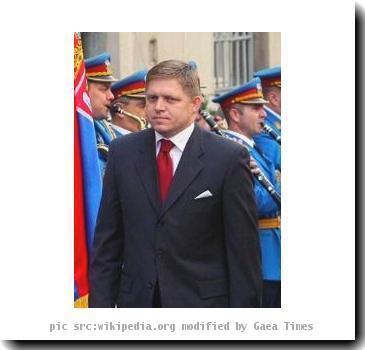Governing coalition faces strong challenge from center-right opposition in Slovakia election
By Karel Janicek, APSaturday, June 12, 2010
Slovakia coalition fighting for survival
BRATISLAVA, Slovakia — Slovakia’s three party governing coalition is fighting for survival in a parliamentary election on Saturday, challenged in a tight race by the center-right opposition.
Prime Minister Robert Fico’s left-leaning party — which has promised to maintain the welfare state, in contrast to the budget-cutting being implemented in several other European countries — appears according to polls to be heading for the largest share of the vote.
And the chances of its junior coalition partner, the ultranationalist Slovak National Party of Jan Slota, were boosted by the recent escalation of tension in the traditionally difficult Slovak-Hungarian relations.
Yet that may not be enough for a majority because another coalition partner, the party of former authoritarian Prime Minister Vladimir Meciar, might not clear the five-percent threshold necessary for parliamentary representation, polls indicate. A trio of center-right challengers might be able to form a governing coalition with a good election result and support from two ethnic Hungarians parties.
“I believe that it will be us who will form the government,” said Iveta Radicova, the election leader of the major opposition Slovak Democratic and Christian Union, whose free-market reforms earned the country NATO and EU membership.
The opposition pledged to improve the business environment, create new jobs, reduce the deficit and fight corruption.
It was not immediately clear if turnout would be higher than the record low of 54.7 percent four years ago. Some parts of the country have been recovering from flooding last week and Slovakia has been hit by a wave of hot weather.
Despite the country’s ballooning budget deficit, the campaign was dominated by debate over a new Hungarian citizenship law, not the economy.
Slota, who is known for derogatory comments about Hungarians and other Slovak leaders, condemned last month’s move by Hungary to make it easier for ethnic Hungarians in neighboring countries to acquire Hungarian citizenship.
Many ethnic Hungarians, including 520,000 in Slovakia, live in areas that were part of Hungary until the end of World War I.
Calling dual citizenship a security risk, Slovakia responded with a law allowing authorities to strip Slovak citizenship from those who become Hungarian citizens.
“I hope that the Slovak nation will wake up,” Slota said Saturday after casting his ballot.
But the country, recovering from an economic downturn, has other pressing problems, analysts said.
Since joining the euro zone in 2009, the budget deficit has ballooned.
The country’s debt, at 41 percent of gross domestic product, is still well below the EU’s prescribed 60 percent but analysts have warned that a new government may not be able to meet the 2010 budget deficit target of 5.5 percent of GDP.
The Association of Economic Analysts predicted this month the deficit could reach 7.4 percent.
The Institute of Economic and Social Studies, a think tank in Bratislava said the major parties have failed to provide concrete plans for necessary austerity measures.
An analyst at the institute said the Slovak economy — which was quickly recovering from an economic downturn with a solid 4.6-percent year-on-year growth in the first quarter of this year — cannot be compared with Hungary, which had to be saved from defaulting on its debts by a €20 billion ($24 billion) loan in late 2008 from the IMF, World Bank and European Union, at least for now.
But, analyst Richard Durana said, “These problems must be solved.”
Fico, considered a populist leader, has rejected cutting welfare benefits, as other EU countries, including Britain, have been doing to avert a debt crisis like that of Greece.
Instead, Fico pledged to fight tax evasion and support the economic growth.
He was a vocal opponent of the U.S.-led war in Iraq and withdrew Slovak troops. He also said he would not allow any part of the Obama administration’s revamped U.S. missile shield planned for Europe to be based in Slovakia.
Parliament’s 150 seats are at stake in the country of 5.4 million, with 18 parties in the running.
One of the first tasks for the new parliament will be to vote on Slovakia’s €800 million share of the €110 billion EU bailout plan for Greece.
Tags: Bratislava, Eastern Europe, Europe, Hungary, North America, Parliamentary Elections, Robert Fico, Slovakia, United States

